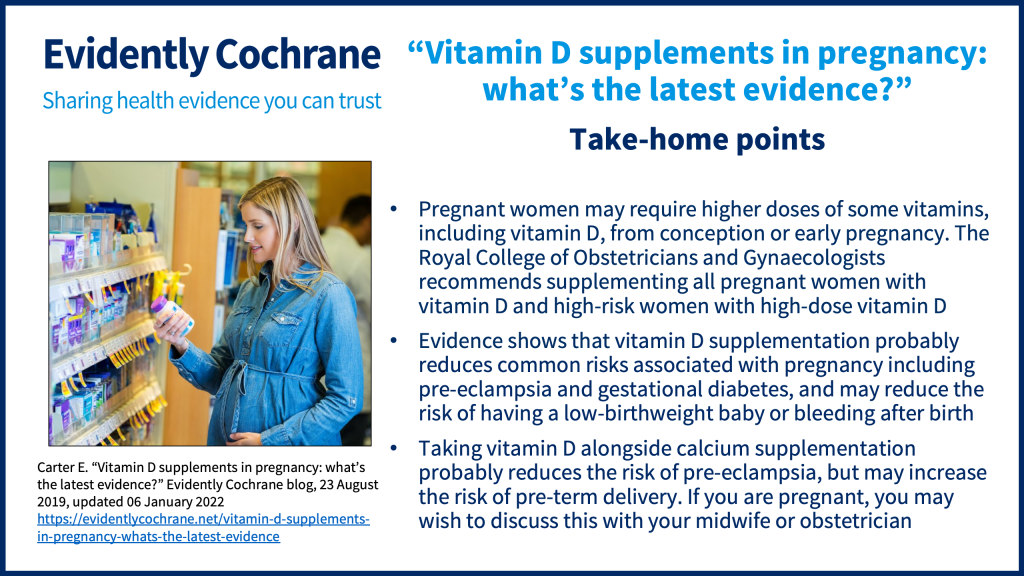In this blog for pregnant women, Emily Carter, Cochrane UK Fellow and Obstetrics and Gynaecology Registrar, looks at the latest Cochrane evidenceCochrane Reviews are systematic reviews. In systematic reviews we search for and summarize studies that answer a specific research question (e.g. is paracetamol effective and safe for treating back pain?). The studies are identified, assessed, and summarized by using a systematic and predefined approach. They inform recommendations for healthcare and research. on vitamin D supplementation in pregnancy and how it may help reduce risks for mums and babies in the UK. This blog is part of a series called ‘Maternity Matters’.
Page originally published: 23 August 2019. Page republished: 06 January 2022, incorporating new evidence.
Take-home points
What we already know
Vitamin D forms from sunlight on the skin and is used by the body to absorb calcium, needed for healthy bones and teeth. Up to half of all pregnant women in the UK are deficienct, which is more common in winter than in summer. Vitamin D deficiency disproportionately affects black and minority ethnic groups, those who cover their skin, those who are overweight and those with chronic illnessA health condition marked by long duration, by frequent recurrence over a long time, and often by slowly progressing seriousness. For example, rheumatoid arthritis., and particular care should be taken to advise these women (National Institute for Health and Care Excellence, 2019).
Pregnant women who are deficient (blood serum level <50nm) are more likely to have pregnancy complications including pre-eclampsia, diabetes, preterm birth and small babies. Babies born deficienct may have affected bone growth or in severe cases rickets (flexible bones). Deficiency has also been linked with the development of childhood allergy (European Food SafetyRefers to serious adverse effects, such as those that threaten life, require or prolong hospitalization, result in permanent disability, or cause birth defects. Authority, 2016; Royal College of Obstetricians & Gynaecologists, 2014).
An evidence gap
Whilst the Royal College of Obstetricians and Gynaecologists (RCOG) supports supplementing pregnant women with vitamin D (Royal College of Obstetricians & Gynaecologists, 2014), until now there has been a lack of evidence confirming the benefits and harms of this. In practice, it has been confusing what to advise women – should they be given a low dose supplement, a high-dose supplement, or should they be tested for deficiency and treated if deficient in this important nutrient?
Although most pregnancy multivitamins contain 10 micrograms (400 international units), for women at high riskA way of expressing the chance of an event taking place, expressed as the number of events divided by the total number of observations or people. It can be stated as ‘the chance of falling were one in four’ (1/4 = 25%). This measure is good no matter the incidence of events i.e. common or infrequent. of vitamin D deficiency this may not be enough and they might benefit from a higher dose supplement. The criteria for who precisely who should be considered ‘high risk’ is unclear. In practice, local guidelines have used ‘common sense’ criteria, recommending a higher dose in women with some chronic illnesses and those who are less likely to absorb vitamin D from sunlight on the skin; but this has not been convincingly evidence-based so far (NHS Oxfordshire Clinical Commissioning Group, 2017; Royal College of Obstetricians & Gynaecologists, 2014).
It is also not clear what dose is required to gain the benefit of supplementation. There is also the issue of potential harms – we need to know what the best available evidence is about the possibility of harm from treatmentSomething done with the aim of improving health or relieving suffering. For example, medicines, surgery, psychological and physical therapies, diet and exercise changes. in order to counsel women about the safety of taking pregnancy supplements.
What does the new Cochrane evidence on vitamin D add?
An important Cochrane ReviewCochrane Reviews are systematic reviews. In systematic reviews we search for and summarize studies that answer a specific research question (e.g. is paracetamol effective and safe for treating back pain?). The studies are identified, assessed, and summarized by using a systematic and predefined approach. They inform recommendations for healthcare and research. (published in 2019) summarises the evidence base for Vitamin D supplementation in pregnancy; it includes 30 research studies and over 3700 pregnant women were included. Before this review, we knew that babies from mothers who lacked vitamin D have poorer outcomesOutcomes are measures of health (for example quality of life, pain, blood sugar levels) that can be used to assess the effectiveness and safety of a treatment or other intervention (for example a drug, surgery, or exercise). In research, the outcomes considered most important are ‘primary outcomes’ and those considered less important are ‘secondary outcomes’., but it had not been convincingly demonstrated that supplementation improved outcomes for those at risk.
It showed that taking vitamin D supplements in pregnancy:
- Probably reduces the risk of getting pre-eclampsia and gestational diabetes
- May reduce the risk of having a low-birthweight baby
- May reduce the risk of severe bleeding after birth
- May make little or no difference to the risk of preterm birth before 37 weeks
Only one of the studies looked at whether there was any harm from taking vitamin D and nothing certain was shown.
Taking vitamin D and calcium supplements together in pregnancy: what does the evidence say?
The review also shows that women who take vitamin D and calcium together in pregnancy probably have a reduced risk of developing pre-eclampsia. However, there may be an increased risk of preterm birth less than 37 weeks. These results warrant further research.
Whilst there are potential harms of taking combined calcium and vitamin D supplementation, the benefits for those at risk of pre-eclampsia may outweigh these harms. Women considering this should discuss with their midwife and obstetrician in early pregnancy.
What dose of vitamin D supplementation is safe in pregnancy?
Although this review is helpful in showing the relative benefits of supplementation, it does not tell us about the effects of different doses. For this reason, another Cochrane Review (published in 2019) looked at the effects and safety of different vitamin D supplementation regimens in pregnancy. The authors found that:
- supplementation with more than the current vitamin D recommendation (601 international units a day or more) during pregnancy may reduce the risk of gestational diabetes but may make little or no difference to the risk of pre‐eclampsia, preterm birth or low birthweight compared to women receiving the current recommended dose (600 IU/d or less).
- supplementation with more than the current upper limit for vitamin D (4000 international units a day or more) during pregnancy may make little or no difference to the risk of pre‐eclampsia, gestational diabetes, preterm birth or low birthweight compared to women receiving 3999 IU/d or less.
What questions do we still have left to answer?
Should all women be screened for vitamin D deficiency?
There is no evidence supporting the use of universal screening for vitamin D deficiency in pregnancy, or telling us which groups of women this might be most useful for. The Royal College of Obstetricians and Gynaecologists recommends screening for very high-risk women, for instance those with symptoms, brittle bones, or those with chronic illness who may not be able to absorb vitamins from the intestines. Many local guidelines follow this advice (NHS Oxfordshire Clinical Commissioning Group, 2017). This is ‘common sense’ practice but it is not convincingly evidence-based.
What can be done to spread the message?
This latest evidence, which now gives greater certainty that vitamin D supplementation is probably beneficial in reducing some common risks associated with pregnancy, may be helpful in informing any planned updates of existing UK and international guidelines and their local implementation by NHS Clinical Commissioning Groups.
Development of patient information leaflets and online information which can be read at home can facilitate discussion with your obstetrician and midwife regarding individualised pregnancy risks and which supplements will be of most benefit.
The development of a clinical calculator to assess each woman at her first antenatal booking appointment for the need to take vitamin D, aspirin, calcium, high-dose folic acid and low molecular weight heparin (blood thinning injections for those at high risk of a blood clot) would help reach those women who may not know they could reduce their pregnancy risk by taking these supplements or treatments early on in pregnancy.
Join in the conversation with @CochraneUK @Emily_Carter88 #MaternityMatters or leave a comment on the blog.
Emily Carter has nothing to disclose.




nice article
[…] 參考文獻資料:https://americanpregnancy.org/healthy-pregnancy/pregnancy-health-wellness/vitamin-d-and-pregnancy/https://www.samitivejhospitals.com/article/detail/vitamin-d-pregnant-womenhttps://www.evidentlycochrane.net/vitamin-d-supplements-in-pregnancy-whats-the-latest-evidence/ […]
[…] together with vitamin D, from conception or early being pregnant. It’s because, based on Cochrane findings, proof reveals that vitamin D supplementation in all probability reduces frequent dangers […]
Before pregnancy and during it, I took vitamin D on the recommendation of a doctor. First, a deficiency was identified, filled with the help of Wellabs D3 Drops 10000IU. When the indicator became above 50 units, the dose was reduced to 2000IU
[…] منبع: evidentlycochrane […]
[…] This story originally featured on Evidently Cochrane’s Blog. […]
Please is it possible to add a working link for the references? And when is the Cochrane Review on vitamin D supplementation regimens in pregnancy expected to be published?
The link works when I try it – have you tried from a different browser? In case you can’t get them, I’ll paste them below. The vitamin D supplementation regimens review is here https://www.cochranelibrary.com/cdsr/doi/10.1002/14651858.CD013446/full?highlightAbstract=d%7Cin%7Cvitamin%7Cpregnanc%7Cpregnancy
European Food Safety Authority (EFSA). Scientific Opinion on Dietary Reference Values for Vitamin D. EFSA Journal 2016;14(10):4547. Available from: https://efsa.onlinelibrary.wiley.com/doi/epdf/10.2903/j.efsa.2016.4547
Hofmeyr GJ, Lawrie TA, Atallah ÁN, Torloni MR. Calcium supplementation during pregnancy for preventing hypertensive disorders and related problems. Cochrane Database of Systematic Reviews 2018, Issue 10. Art. No.: CD001059. DOI: 10.1002/14651858.CD001059.pub5. Available from: https://www.cochranelibrary.com/cdsr/doi/10.1002/14651858.CD001059.pub5/full
NHS Oxfordshire Clinical Commissioning Group; Oxford University Hospitals NHS Foundation Trust. Vitamin D Supplementation in Pregnancy. Oxford: NHS Oxfordshire Clinical Commissioning Group; 2017. Available from: http://www.oxfordshireccg.nhs.uk/professional-resources/documents/clinical- guidelines/endocrinology/Vitamin-D-supplementation-in-pregnancy-guideline.pdf
National Institute for Health and Care Excellence. Antenatal care for uncomplicated pregnancies. London: National Institute for Health and Care Excellence; February 2019 (NICE CG62). [Issued March 2008; last updated February 2019]. Available from: https://www.nice.org.uk/guidance/cg62/chapter/1-Guidance#lifestyle-considerations
National Institute for Heath and Care Excellence. Vitamin D: supplement use in specific population groups. London: National Institute for Health and Care Excellence; 2017. (NICE Public Health Guidance PH56). [Issued November 2014; last updated August 2017]. Available from: https://www.nice.org.uk/guidance/ph56
Palacios C, Kostiuk LK, Peña-Rosas JP. Vitamin D supplementation for women during pregnancy. Cochrane Database of Systematic Reviews 2019, Issue 7. Art. No.: CD008873. DOI: 10.1002/14651858.CD008873.pub4 https://www.cochranelibrary.com/cdsr/doi/10.1002/14651858.CD008873.pub4/full
Royal College of Obstetricians & Gynaecologists. Vitamin D in Pregnancy. (Scientific Impact Paper No. 43). London: Royal College of Obstetricians & Gynaecologists; June 2014. Available from: https://www.rcog.org.uk/globalassets/documents/guidelines/scientific- impact-papers/vitamin_d_sip43_june14.pdf
Scientific Advisory Committee on Nutrition. Vitamin D and Health. London: Public Health England; July, 2016. Available from: https://assets.publishing.service.gov.uk/government/uploads/system/uploads/attachment_ data/file/537616/SACN_Vitamin_D_and_Health_report.pdf